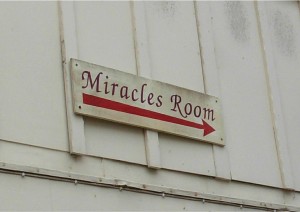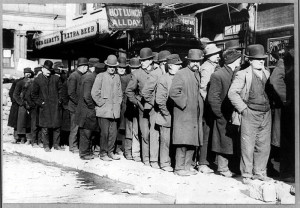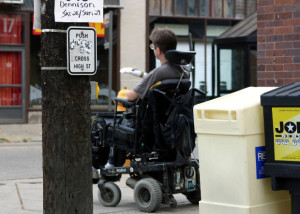The U.S. Court of Appeals for Veterans Claims (CAVC) has unique statutory authority. Unlike any other federal appellate court, individual judges – not panels of judges – can decide Veterans’ appeals. This means, unlike any other set of citizens in the land, Veterans are singled out for discriminatory treatment by the one court which reviews decisions made by the Department of Veterans Affairs (VA). Continue reading
Articles Posted in Veteran Affairs
VA Is Not Really Reducing The Claims Backlog
The Department of Veterans Affairs (VA) proudly advertises that the disability claims backlog is now under control. Under Secretary for Benefits Alison Hickey has stated categorically that VA’s goal is to eliminate the claims backlog by the end of 2015 – “meaning all Veterans will receive timely and accurate decisions on their disability claims.”
How is this miracle possible? The answer is, it’s not possible. VA is not offering timely and accurate decisions on disability claims. Here is how they are really addressing the claims backlog: Continue reading
Women Veterans – How VA Is Shortchanging Your Claims
On March 13, 2015, H.R. 1356 “Women Veterans Access to Quality Care Act of 2015” was introduced in Congress. Among other mandates, if passed this bill would require the Department of Veterans Affairs (VA) to ensure every VA medical center has a full-time obstetrician or gynecologist.
Can you believe it? It would take an act of Congress to ensure that VA’s medical centers have at least one full-time obstetrician or gynecologist on staff? Continue reading
No Choice With VA’s Veterans Choice Program
A little over a year ago, on August 7, 2014, the “Veterans Access, Choice, and Accountability Act of 2014,” P.L. 113-146, was signed into law. The so-called “Choice Act” was intended to improve Veterans’ access to medical services from the Department of Veterans Affairs (VA).
An important part of the Choice Act was allowing Veterans to use private physicians if they were unable to schedule an appointment at a VA medical facility within specified wait-time limits, or lived more than 40 miles from a VA medical facility, or met other eligibility criteria for using a non-VA physician.
More than a year from enactment, has the Choice Act helped Veterans? No, not really. Why? Because VA’s rules still create obstacles to letting Veterans use non-VA medical services. Continue reading
Six Easy Ways to Lose Your VA Benefits
1. Don’t Make a Claim. Ever. This is probably the most common way Veterans miss benefits to which they are entitled. The Department of Veterans Affairs (VA) will not contact you with information about how to claim benefits. No one will pass along your service information to VA. The entire burden of asserting a claim and initiating the benefits process rests entirely on you.
The sad fact is that VA is not responsible for any disability you have – if you do not make a claim. Bottom line? No claim = no benefits. Even worse, benefits only start counting from the time you file a claim! So – waiting to file a claim for benefits only means you and your dependents will receive LESS. You will not receive back pay worth millions if you wait 20 years to file your claim. You’ll only have lost out on all those benefits. Continue reading
VA’s Upcoming Changes to Pension Benefits: Are You Prepared?
Constant vigilance is important in any estate plan involving Veterans benefits. Earlier this year, the Department of Veterans Affairs (VA) published a proposed rule to amend its regulations governing entitlement to certain pension benefits.
Why is VA proposing changes now to an institution designed to assist wartime Veterans, their surviving spouses, and their children? VA specifically states it plans to change pension rules under the Veterans’ and Survivors’ Pension Improvement Act of 1978 because “we have received information that, under current regulations, claimants who are not actually in need may qualify for these needs-based benefits.” VA further notes that pension changes will go beyond administration of this particular Act, stating, “[f]or clarity and consistency, some of the changes we propose would apply to other needs-based benefits as well.” Continue reading
Don’t Get Left Behind! Changing Rules May Change Your VA Benefits
The Department of Veterans Affairs (VA) is in the middle of changing its Schedule for Rating Disabilities, the VASRD. If you’ve ever looked at the VASRD and been confused, you’re in good company. Unfortunately, the VASRD doesn’t function like a menu, so it can be quite misleading. Also, the current VASRD doesn’t account for impact of service-connected disability on your overall life. Right now, VA only assesses disabilities based on perceived impact to your income.
You can readily understand that the inability to walk affects all aspects of your life and well-being, even if you are able to sit at a computer for hours for work. Knowing how the current VASRD operates and how any changes may impact your claim for benefits is crucial. You definitely don’t want to leave a higher rating on the table if the new standards will actually take into account the full impact of your disabilities, such as the fact that you can work but you can’t walk. Continue reading
Get Help With Your VA Benefits Claim
If you or I made a clear and unmistakable error which had a huge price tag, we’d expect some consequence. Like, we might get fired. Or demoted. Or something else undesirable would happen. That’s not at all the case with “Clear and Unmistakable Error” (CUE) actions by claims examiners at the Department of Veterans Affairs (VA).
Far from any remedial or disciplinary action for committing a CUE, as far as we can tell, nothing happens at VA. No training, no discipline. In fact, we’ve been informed that CUEs aren’t even tracked, making it impossible to tell what’s going on. If for no other purpose than training claims examiners to avoid making the same mistake over and over again, one would think CUEs should be tracked by VA. Continue reading
Veterans, Spouses, and Domestic Partners: What You Don’t Know About Presumptive Diseases Can Kill Your Benefits
Many people assume new illnesses, aches, and pains are “normal.” Just part of aging. Or simply bad luck. Or even genetics. Veterans – don’t be lulled into passive acceptance of so-called common wisdom. Diet and exercise can only get you so far with the many health problems – some tremendously serious – which may be the result of your military service. In addition, some health issues, such as birth defects, may be results of your military service that affect not only you but your entire family. Continue reading
Taking the Fight to Veterans: Why VA’s Mandatory Forms Probably Aren’t Legal
 You can’t always believe what you’re told. Unfortunately, the Department of Veterans Affairs (VA) means business when it comes to telling you their new forms are mandatory. And the form that is probably the most harmful is the one you might need the most: VA’s Notice of Disagreement (NOD) form, called VA Form 21-0958.
You can’t always believe what you’re told. Unfortunately, the Department of Veterans Affairs (VA) means business when it comes to telling you their new forms are mandatory. And the form that is probably the most harmful is the one you might need the most: VA’s Notice of Disagreement (NOD) form, called VA Form 21-0958.
Why is this form so harmful? First, because it is a trick. It is designed to get you to eliminate most of the reasons you are challenging VA’s refusals. Second, and even more insidious, the NOD form may not even be legal. But right now, VA is forcing you to use it. Continue reading
 Military Veterans' Lawyer Blog
Military Veterans' Lawyer Blog










